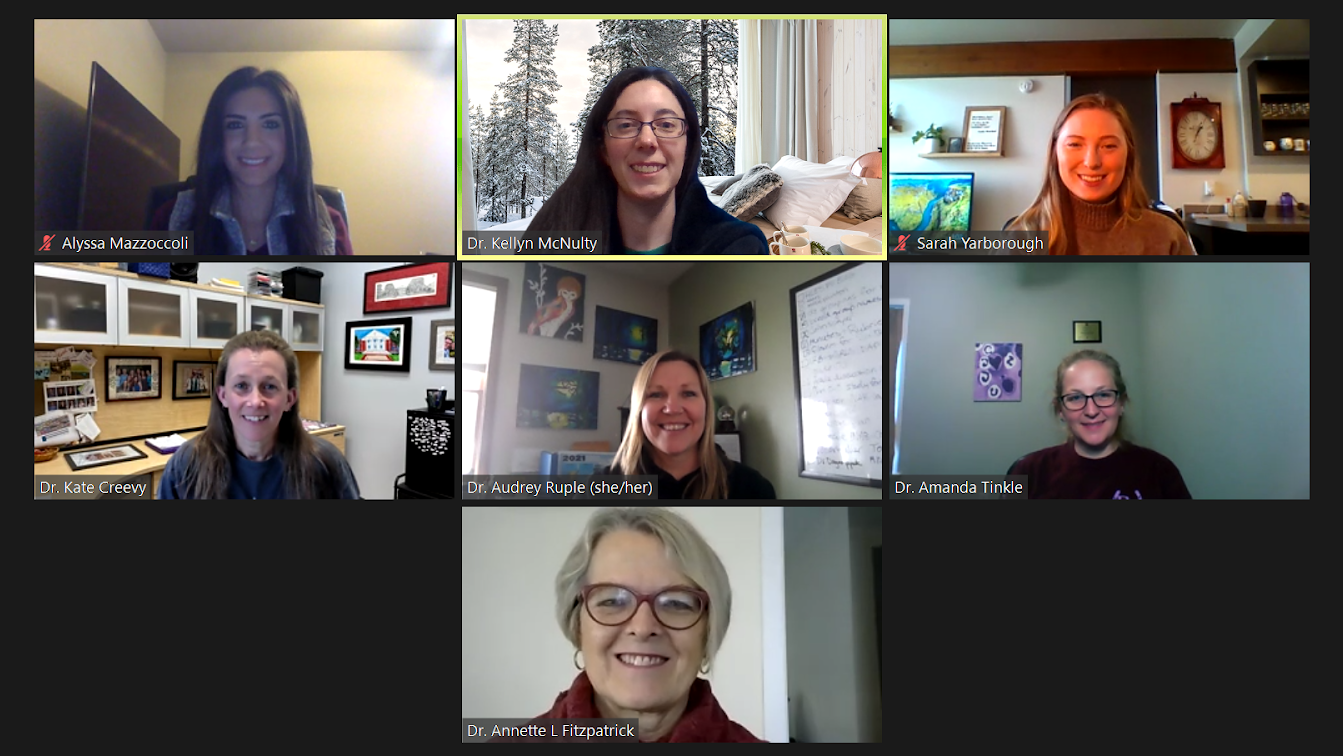Celebrating the International Day of Women and Girls in Science
February 11, 2021 - 8 minutes readThe International Day of Women and Girls in Science was established by the United Nations General Assembly in 2015 and is celebrated every year on February 11th under the auspices of the United Nations Educational, Scientific and Cultural Organization (UNESCO) and the United Nations Entity for Gender Equality and the Empowerment of Women (UN-Women).
The International Day of Women and Girls in Science recognizes the critical role women and girls play in science and technology and promotes full and equal access to and participation in science for women and girls. #WomenInScience
At the Dog Aging Project, we celebrate the International Day of Women and Girls in Science by recognizing the contributions of the many accomplished women who are part of our research team. We had the opportunity to sit down with several of our scientists to talk about their work and what they want science-focused girls and young women to know.
 What aspect of the Dog Aging Project are you most looking forward to?
What aspect of the Dog Aging Project are you most looking forward to?
It is important to me to use community science to promote comfort with, and enthusiasm for, science in the daily lives of all Americans, but most importantly, young people. – Dr. Creevy
I am most excited about the sheer magnitude of data we are collecting, which will be used to answer fundamental and practical questions about canine health and aging, and thus advance the practice of both veterinary and human medicine. – Dr. McNulty
I am looking forward to learning about ways we can improve the health of our companion dogs as well as ourselves. – Dr. Ruple
I am most looking forward to exploring more areas of veterinary medicine and furthering my skills in research. It is a chance for me to study topics I am most passionate about that could improve the health of both humans and animals. – Ms. Mazzoccoli
The incredible breadth and scope of data in the Dog Aging Project allows us to address topics that will improve the lives of both dogs and people. I am very excited to be able to do analyses – and mentor new investigators – to answer very specific questions that impact quality of life for both species! – Dr. Fitzpatrick
I am excited to see the long term impact of the project. I believe we are opening the door to future large scale research projects within veterinary medicine that will continue to improve the healthspan of dogs in ways we haven’t imagined yet. – Dr. Tinkle
I am most excited about seeing how our data analyses can continue to drive further research in the field of dog aging, and can provide answers to questions that might not have been able to have been answered previously. – Ms. Yarborough
What is your message for girls and young women who want to go into science?
Using your mind in service of the greater good is extremely fun and rewarding! I encourage all girls and young women to find something that interests you, and then study it as hard as you can! – Dr. Creevy
While science is an amazing, complex field that sparks valuable curiosity and deep passion, it should only be one component of your life. Do not forget the other important things in life during the often single-minded, determined pursuit of your scientific goals. Although truth be told, I still find this challenging to live out. – Dr. McNulty
Women bring a special perspective to science and our unique viewpoint leads to scientific innovations that impact the whole world. Becoming a scientist is not an easy task, but you can do hard things and your experiences along the way will inform the work you do. It will help to make you a better scientist and a better mentor to others, too. – Dr. Ruple
My advice to girls and young women is to study what you are passionate about and follow your dreams! Continue to be inquisitive and challenge yourself to think outside the box at times. Science is full of unique opportunities and experiences, and women play an integral part in new scientific advancements! – Ms. Mazzoccoli
Scientific research – especially epidemiology – is very exciting and fun! A research career can fit very well into the life of women; we have a lot to offer the field. – Dr. Fitzpatrick
If you enjoy any aspect of science, do not hesitate to follow that love to a career. It is easy to be dissuaded from reaching your goals, but it is more rewarding to challenge yourself to reach them anyway. – Dr. Tinkle
Don’t let people discourage you from following your passion to pursue science/STEM. You may encounter challenges and obstacles along the way, and there may be people who will lead you to doubt your abilities. But if you are passionate about the field, then dive in! There is so much for you to learn in the field of science! – Ms. Yarborough

Dr. Kate Creevy is our Chief Veterinary Officer as well as an Associate Professor of Small Animal Internal Medicine at Texas A&M University’s College of Veterinary Medicine and a practicing small animal internist.
Dr. Annette Fitzpatrick is an epidemiologist and Research Professor in the Departments of Family Medicine, Epidemiology, and Global Health at the University of Washington.
Alyssa Mazzoccoli is a research assistant to the Dog Aging Project.
Dr. Kellyn McNulty is veterinarian and research fellow with the Dog Aging Project and a small animal internal medicine resident at Texas A&M University’s College of Veterinary Medicine.
Dr. Audrey Ruple is the Assistant Professor of One Health Epidemiology in the Department of Public Health at Purdue University. She is a licensed, clinical veterinarian and is a Diplomate of the American College of Veterinary Preventive Medicine.
Dr. Amanda Tinkle is an animal science researcher and project manager for the Dog Aging Project.
Sarah Yarborough is a PhD student working with Dr. Fitzpatrick.
Tags: General